Operational Management and Leadership
VerifiedAdded on 2020/10/22
|11
|3156
|257
AI Summary
The provided assignment highlights the significance of operational management in a business context. It emphasizes that operational management is crucial for gaining customer loyalty and providing high-level satisfaction. The report also underscores the importance of leadership in overcoming challenging situations, using various management approaches to bring improvements at the workplace.
Contribute Materials
Your contribution can guide someone’s learning journey. Share your
documents today.
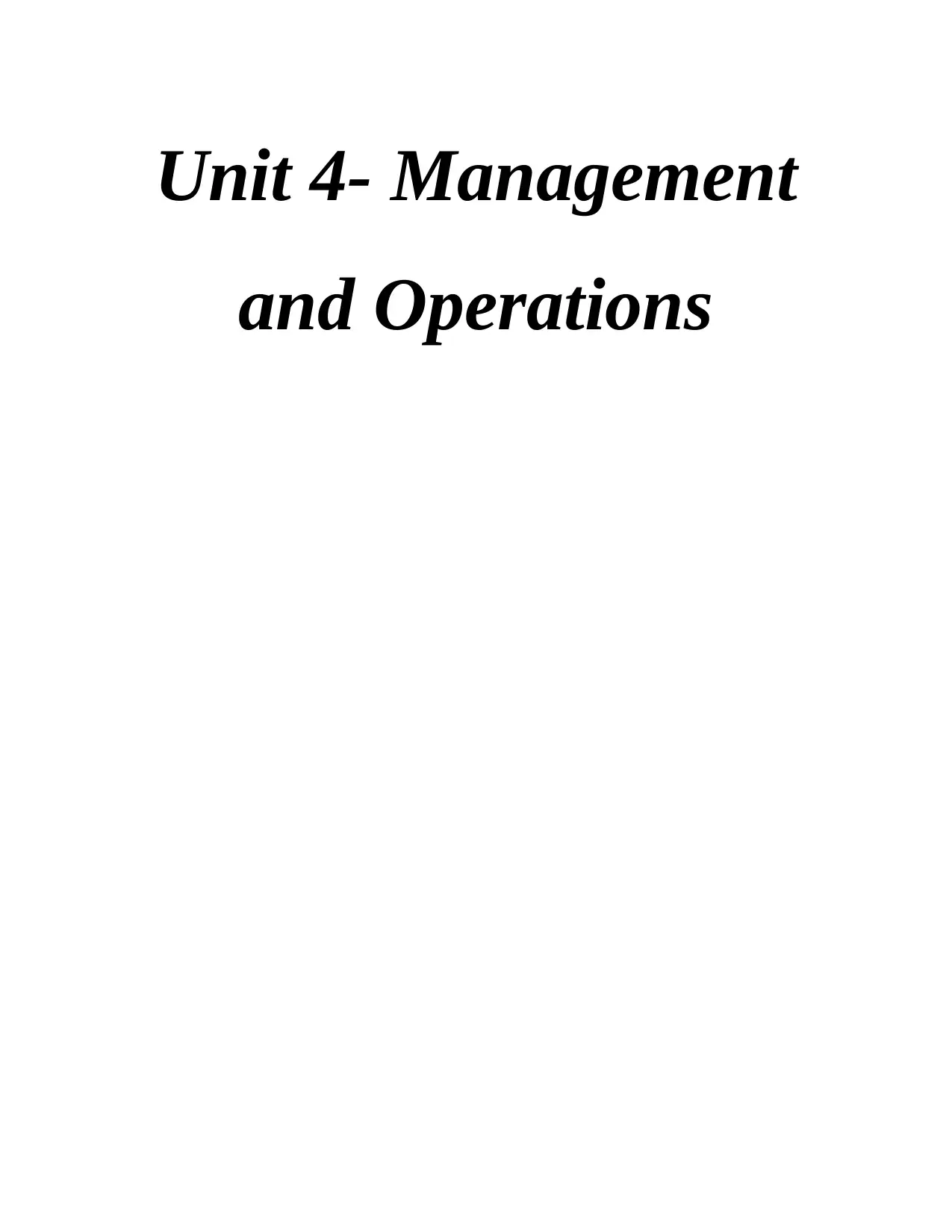
Unit 4- Management
and Operations
and Operations
Secure Best Marks with AI Grader
Need help grading? Try our AI Grader for instant feedback on your assignments.
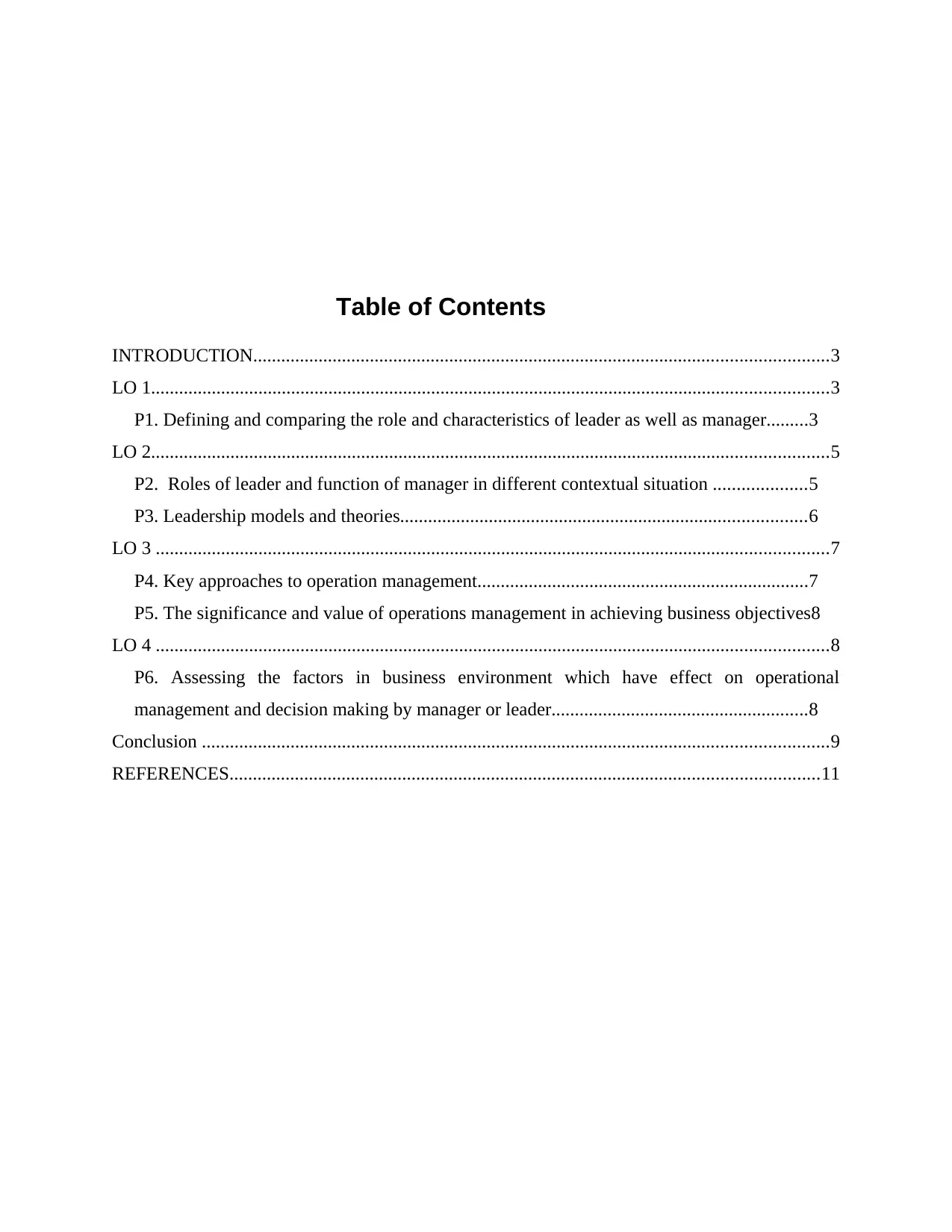
Table of Contents
INTRODUCTION...........................................................................................................................3
LO 1.................................................................................................................................................3
P1. Defining and comparing the role and characteristics of leader as well as manager.........3
LO 2.................................................................................................................................................5
P2. Roles of leader and function of manager in different contextual situation ....................5
P3. Leadership models and theories.......................................................................................6
LO 3 ................................................................................................................................................7
P4. Key approaches to operation management.......................................................................7
P5. The significance and value of operations management in achieving business objectives8
LO 4 ................................................................................................................................................8
P6. Assessing the factors in business environment which have effect on operational
management and decision making by manager or leader.......................................................8
Conclusion ......................................................................................................................................9
REFERENCES..............................................................................................................................11
INTRODUCTION...........................................................................................................................3
LO 1.................................................................................................................................................3
P1. Defining and comparing the role and characteristics of leader as well as manager.........3
LO 2.................................................................................................................................................5
P2. Roles of leader and function of manager in different contextual situation ....................5
P3. Leadership models and theories.......................................................................................6
LO 3 ................................................................................................................................................7
P4. Key approaches to operation management.......................................................................7
P5. The significance and value of operations management in achieving business objectives8
LO 4 ................................................................................................................................................8
P6. Assessing the factors in business environment which have effect on operational
management and decision making by manager or leader.......................................................8
Conclusion ......................................................................................................................................9
REFERENCES..............................................................................................................................11
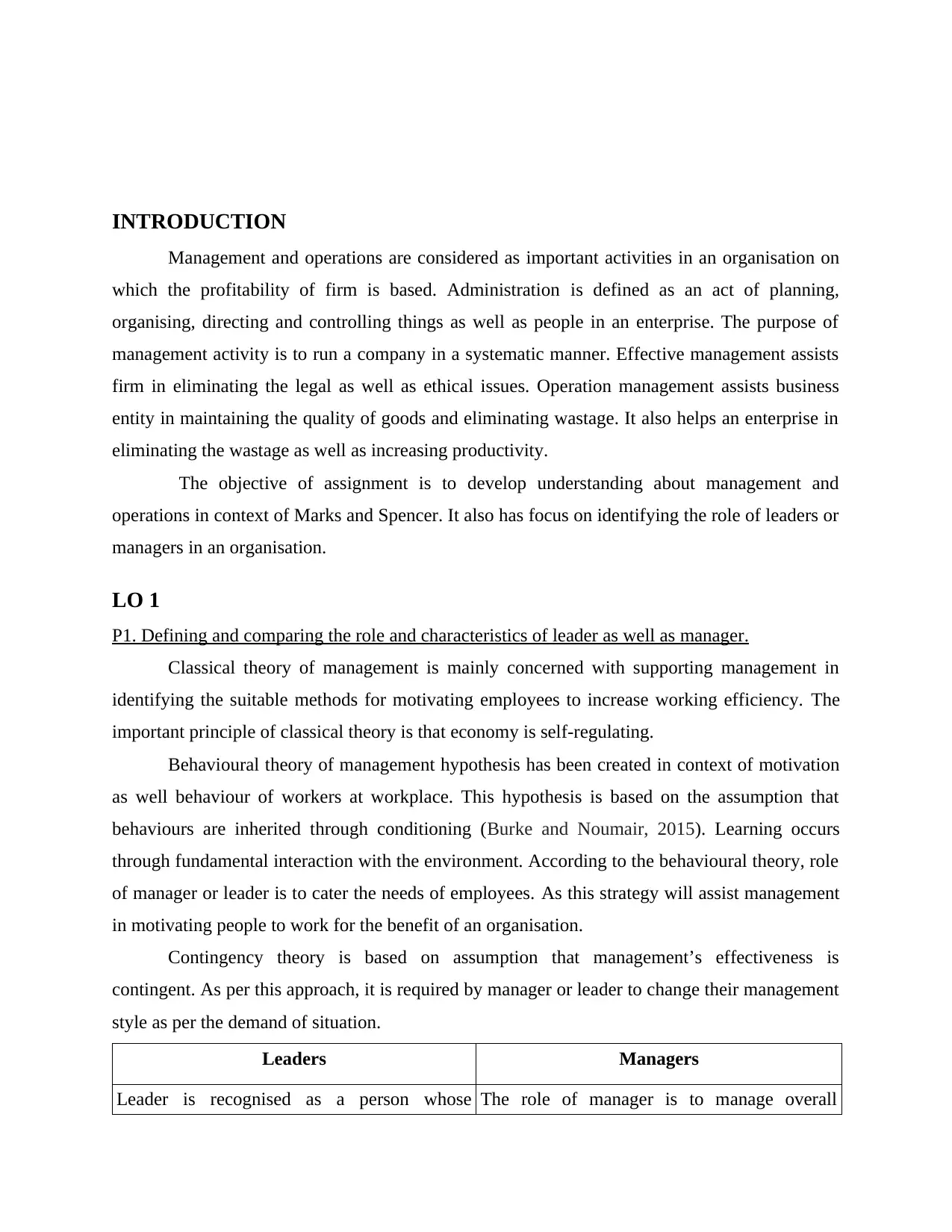
INTRODUCTION
Management and operations are considered as important activities in an organisation on
which the profitability of firm is based. Administration is defined as an act of planning,
organising, directing and controlling things as well as people in an enterprise. The purpose of
management activity is to run a company in a systematic manner. Effective management assists
firm in eliminating the legal as well as ethical issues. Operation management assists business
entity in maintaining the quality of goods and eliminating wastage. It also helps an enterprise in
eliminating the wastage as well as increasing productivity.
The objective of assignment is to develop understanding about management and
operations in context of Marks and Spencer. It also has focus on identifying the role of leaders or
managers in an organisation.
LO 1
P1. Defining and comparing the role and characteristics of leader as well as manager.
Classical theory of management is mainly concerned with supporting management in
identifying the suitable methods for motivating employees to increase working efficiency. The
important principle of classical theory is that economy is self‐regulating.
Behavioural theory of management hypothesis has been created in context of motivation
as well behaviour of workers at workplace. This hypothesis is based on the assumption that
behaviours are inherited through conditioning (Burke and Noumair, 2015). Learning occurs
through fundamental interaction with the environment. According to the behavioural theory, role
of manager or leader is to cater the needs of employees. As this strategy will assist management
in motivating people to work for the benefit of an organisation.
Contingency theory is based on assumption that management’s effectiveness is
contingent. As per this approach, it is required by manager or leader to change their management
style as per the demand of situation.
Leaders Managers
Leader is recognised as a person whose The role of manager is to manage overall
Management and operations are considered as important activities in an organisation on
which the profitability of firm is based. Administration is defined as an act of planning,
organising, directing and controlling things as well as people in an enterprise. The purpose of
management activity is to run a company in a systematic manner. Effective management assists
firm in eliminating the legal as well as ethical issues. Operation management assists business
entity in maintaining the quality of goods and eliminating wastage. It also helps an enterprise in
eliminating the wastage as well as increasing productivity.
The objective of assignment is to develop understanding about management and
operations in context of Marks and Spencer. It also has focus on identifying the role of leaders or
managers in an organisation.
LO 1
P1. Defining and comparing the role and characteristics of leader as well as manager.
Classical theory of management is mainly concerned with supporting management in
identifying the suitable methods for motivating employees to increase working efficiency. The
important principle of classical theory is that economy is self‐regulating.
Behavioural theory of management hypothesis has been created in context of motivation
as well behaviour of workers at workplace. This hypothesis is based on the assumption that
behaviours are inherited through conditioning (Burke and Noumair, 2015). Learning occurs
through fundamental interaction with the environment. According to the behavioural theory, role
of manager or leader is to cater the needs of employees. As this strategy will assist management
in motivating people to work for the benefit of an organisation.
Contingency theory is based on assumption that management’s effectiveness is
contingent. As per this approach, it is required by manager or leader to change their management
style as per the demand of situation.
Leaders Managers
Leader is recognised as a person whose The role of manager is to manage overall
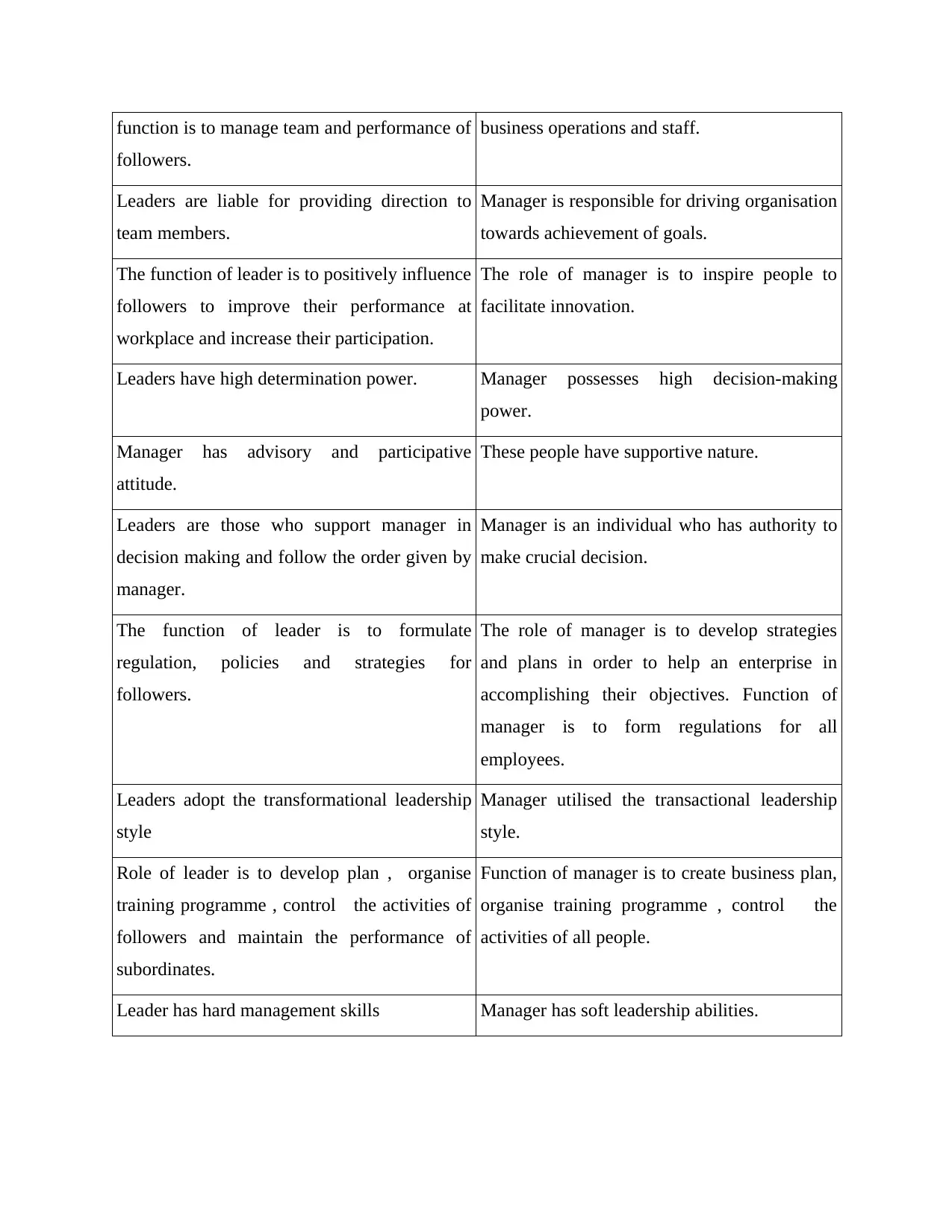
function is to manage team and performance of
followers.
business operations and staff.
Leaders are liable for providing direction to
team members.
Manager is responsible for driving organisation
towards achievement of goals.
The function of leader is to positively influence
followers to improve their performance at
workplace and increase their participation.
The role of manager is to inspire people to
facilitate innovation.
Leaders have high determination power. Manager possesses high decision-making
power.
Manager has advisory and participative
attitude.
These people have supportive nature.
Leaders are those who support manager in
decision making and follow the order given by
manager.
Manager is an individual who has authority to
make crucial decision.
The function of leader is to formulate
regulation, policies and strategies for
followers.
The role of manager is to develop strategies
and plans in order to help an enterprise in
accomplishing their objectives. Function of
manager is to form regulations for all
employees.
Leaders adopt the transformational leadership
style
Manager utilised the transactional leadership
style.
Role of leader is to develop plan , organise
training programme , control the activities of
followers and maintain the performance of
subordinates.
Function of manager is to create business plan,
organise training programme , control the
activities of all people.
Leader has hard management skills Manager has soft leadership abilities.
followers.
business operations and staff.
Leaders are liable for providing direction to
team members.
Manager is responsible for driving organisation
towards achievement of goals.
The function of leader is to positively influence
followers to improve their performance at
workplace and increase their participation.
The role of manager is to inspire people to
facilitate innovation.
Leaders have high determination power. Manager possesses high decision-making
power.
Manager has advisory and participative
attitude.
These people have supportive nature.
Leaders are those who support manager in
decision making and follow the order given by
manager.
Manager is an individual who has authority to
make crucial decision.
The function of leader is to formulate
regulation, policies and strategies for
followers.
The role of manager is to develop strategies
and plans in order to help an enterprise in
accomplishing their objectives. Function of
manager is to form regulations for all
employees.
Leaders adopt the transformational leadership
style
Manager utilised the transactional leadership
style.
Role of leader is to develop plan , organise
training programme , control the activities of
followers and maintain the performance of
subordinates.
Function of manager is to create business plan,
organise training programme , control the
activities of all people.
Leader has hard management skills Manager has soft leadership abilities.
Secure Best Marks with AI Grader
Need help grading? Try our AI Grader for instant feedback on your assignments.
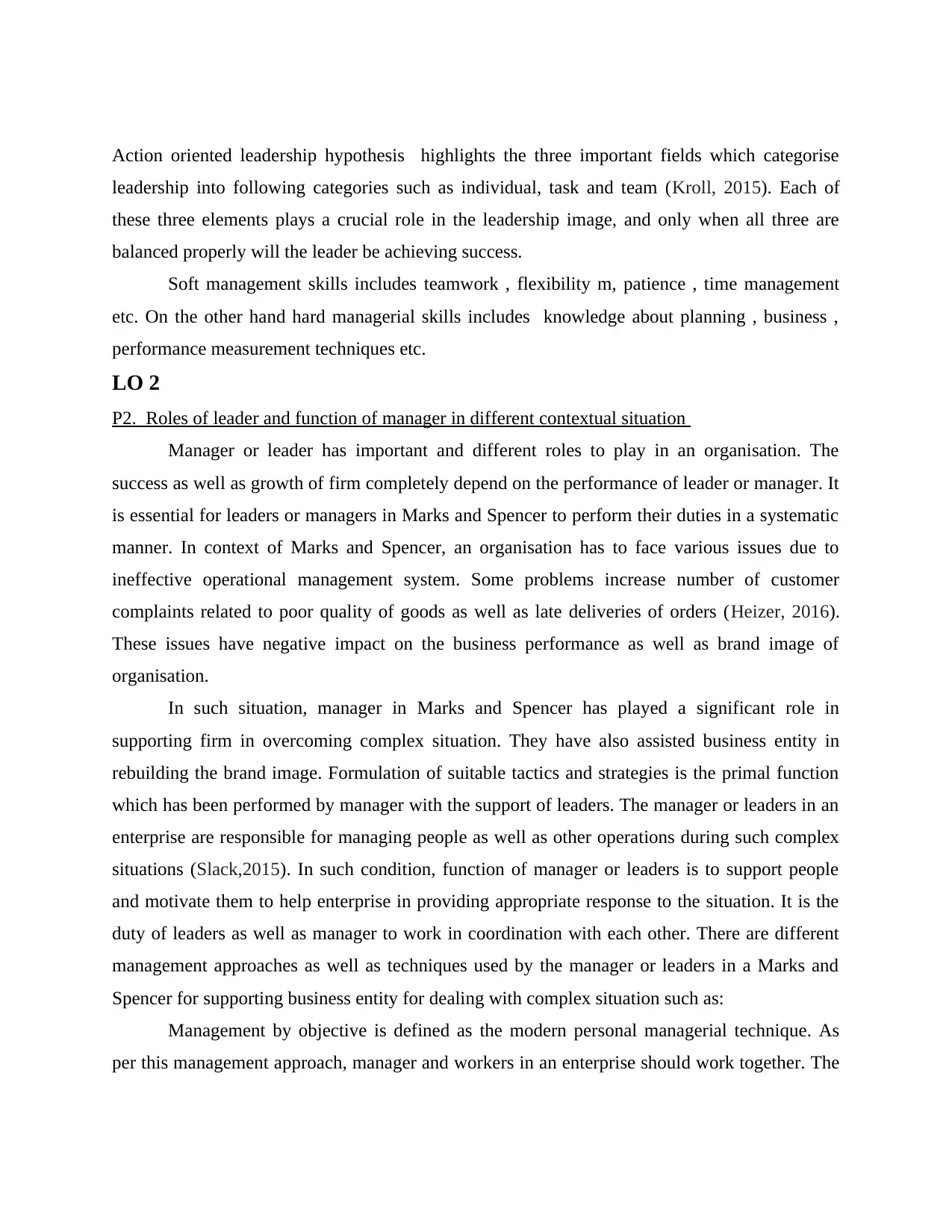
Action oriented leadership hypothesis highlights the three important fields which categorise
leadership into following categories such as individual, task and team (Kroll, 2015). Each of
these three elements plays a crucial role in the leadership image, and only when all three are
balanced properly will the leader be achieving success.
Soft management skills includes teamwork , flexibility m, patience , time management
etc. On the other hand hard managerial skills includes knowledge about planning , business ,
performance measurement techniques etc.
LO 2
P2. Roles of leader and function of manager in different contextual situation
Manager or leader has important and different roles to play in an organisation. The
success as well as growth of firm completely depend on the performance of leader or manager. It
is essential for leaders or managers in Marks and Spencer to perform their duties in a systematic
manner. In context of Marks and Spencer, an organisation has to face various issues due to
ineffective operational management system. Some problems increase number of customer
complaints related to poor quality of goods as well as late deliveries of orders (Heizer, 2016).
These issues have negative impact on the business performance as well as brand image of
organisation.
In such situation, manager in Marks and Spencer has played a significant role in
supporting firm in overcoming complex situation. They have also assisted business entity in
rebuilding the brand image. Formulation of suitable tactics and strategies is the primal function
which has been performed by manager with the support of leaders. The manager or leaders in an
enterprise are responsible for managing people as well as other operations during such complex
situations (Slack,2015). In such condition, function of manager or leaders is to support people
and motivate them to help enterprise in providing appropriate response to the situation. It is the
duty of leaders as well as manager to work in coordination with each other. There are different
management approaches as well as techniques used by the manager or leaders in a Marks and
Spencer for supporting business entity for dealing with complex situation such as:
Management by objective is defined as the modern personal managerial technique. As
per this management approach, manager and workers in an enterprise should work together. The
leadership into following categories such as individual, task and team (Kroll, 2015). Each of
these three elements plays a crucial role in the leadership image, and only when all three are
balanced properly will the leader be achieving success.
Soft management skills includes teamwork , flexibility m, patience , time management
etc. On the other hand hard managerial skills includes knowledge about planning , business ,
performance measurement techniques etc.
LO 2
P2. Roles of leader and function of manager in different contextual situation
Manager or leader has important and different roles to play in an organisation. The
success as well as growth of firm completely depend on the performance of leader or manager. It
is essential for leaders or managers in Marks and Spencer to perform their duties in a systematic
manner. In context of Marks and Spencer, an organisation has to face various issues due to
ineffective operational management system. Some problems increase number of customer
complaints related to poor quality of goods as well as late deliveries of orders (Heizer, 2016).
These issues have negative impact on the business performance as well as brand image of
organisation.
In such situation, manager in Marks and Spencer has played a significant role in
supporting firm in overcoming complex situation. They have also assisted business entity in
rebuilding the brand image. Formulation of suitable tactics and strategies is the primal function
which has been performed by manager with the support of leaders. The manager or leaders in an
enterprise are responsible for managing people as well as other operations during such complex
situations (Slack,2015). In such condition, function of manager or leaders is to support people
and motivate them to help enterprise in providing appropriate response to the situation. It is the
duty of leaders as well as manager to work in coordination with each other. There are different
management approaches as well as techniques used by the manager or leaders in a Marks and
Spencer for supporting business entity for dealing with complex situation such as:
Management by objective is defined as the modern personal managerial technique. As
per this management approach, manager and workers in an enterprise should work together. The
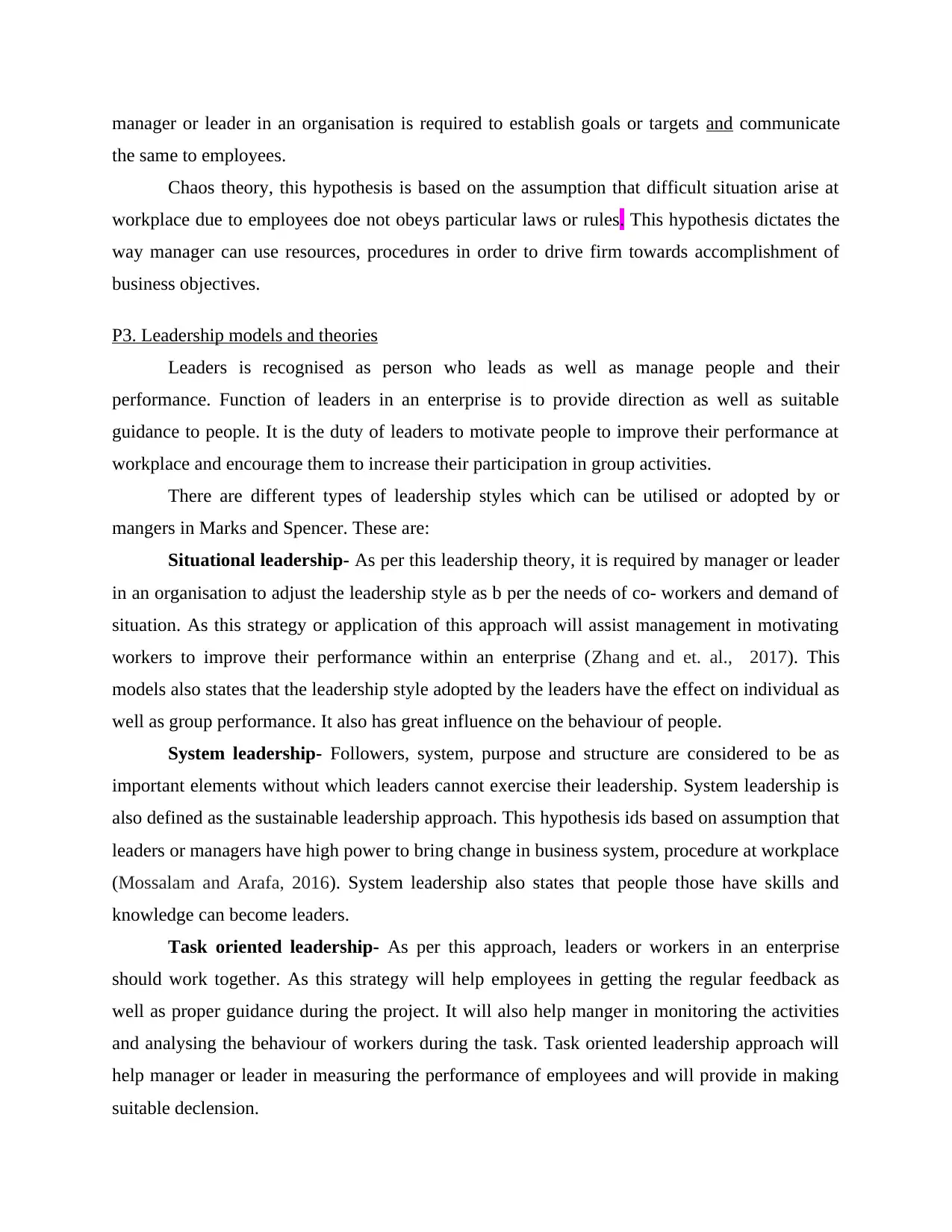
manager or leader in an organisation is required to establish goals or targets and communicate
the same to employees.
Chaos theory, this hypothesis is based on the assumption that difficult situation arise at
workplace due to employees doe not obeys particular laws or rules. This hypothesis dictates the
way manager can use resources, procedures in order to drive firm towards accomplishment of
business objectives.
P3. Leadership models and theories
Leaders is recognised as person who leads as well as manage people and their
performance. Function of leaders in an enterprise is to provide direction as well as suitable
guidance to people. It is the duty of leaders to motivate people to improve their performance at
workplace and encourage them to increase their participation in group activities.
There are different types of leadership styles which can be utilised or adopted by or
mangers in Marks and Spencer. These are:
Situational leadership- As per this leadership theory, it is required by manager or leader
in an organisation to adjust the leadership style as b per the needs of co- workers and demand of
situation. As this strategy or application of this approach will assist management in motivating
workers to improve their performance within an enterprise (Zhang and et. al., 2017). This
models also states that the leadership style adopted by the leaders have the effect on individual as
well as group performance. It also has great influence on the behaviour of people.
System leadership- Followers, system, purpose and structure are considered to be as
important elements without which leaders cannot exercise their leadership. System leadership is
also defined as the sustainable leadership approach. This hypothesis ids based on assumption that
leaders or managers have high power to bring change in business system, procedure at workplace
(Mossalam and Arafa, 2016). System leadership also states that people those have skills and
knowledge can become leaders.
Task oriented leadership- As per this approach, leaders or workers in an enterprise
should work together. As this strategy will help employees in getting the regular feedback as
well as proper guidance during the project. It will also help manger in monitoring the activities
and analysing the behaviour of workers during the task. Task oriented leadership approach will
help manager or leader in measuring the performance of employees and will provide in making
suitable declension.
the same to employees.
Chaos theory, this hypothesis is based on the assumption that difficult situation arise at
workplace due to employees doe not obeys particular laws or rules. This hypothesis dictates the
way manager can use resources, procedures in order to drive firm towards accomplishment of
business objectives.
P3. Leadership models and theories
Leaders is recognised as person who leads as well as manage people and their
performance. Function of leaders in an enterprise is to provide direction as well as suitable
guidance to people. It is the duty of leaders to motivate people to improve their performance at
workplace and encourage them to increase their participation in group activities.
There are different types of leadership styles which can be utilised or adopted by or
mangers in Marks and Spencer. These are:
Situational leadership- As per this leadership theory, it is required by manager or leader
in an organisation to adjust the leadership style as b per the needs of co- workers and demand of
situation. As this strategy or application of this approach will assist management in motivating
workers to improve their performance within an enterprise (Zhang and et. al., 2017). This
models also states that the leadership style adopted by the leaders have the effect on individual as
well as group performance. It also has great influence on the behaviour of people.
System leadership- Followers, system, purpose and structure are considered to be as
important elements without which leaders cannot exercise their leadership. System leadership is
also defined as the sustainable leadership approach. This hypothesis ids based on assumption that
leaders or managers have high power to bring change in business system, procedure at workplace
(Mossalam and Arafa, 2016). System leadership also states that people those have skills and
knowledge can become leaders.
Task oriented leadership- As per this approach, leaders or workers in an enterprise
should work together. As this strategy will help employees in getting the regular feedback as
well as proper guidance during the project. It will also help manger in monitoring the activities
and analysing the behaviour of workers during the task. Task oriented leadership approach will
help manager or leader in measuring the performance of employees and will provide in making
suitable declension.
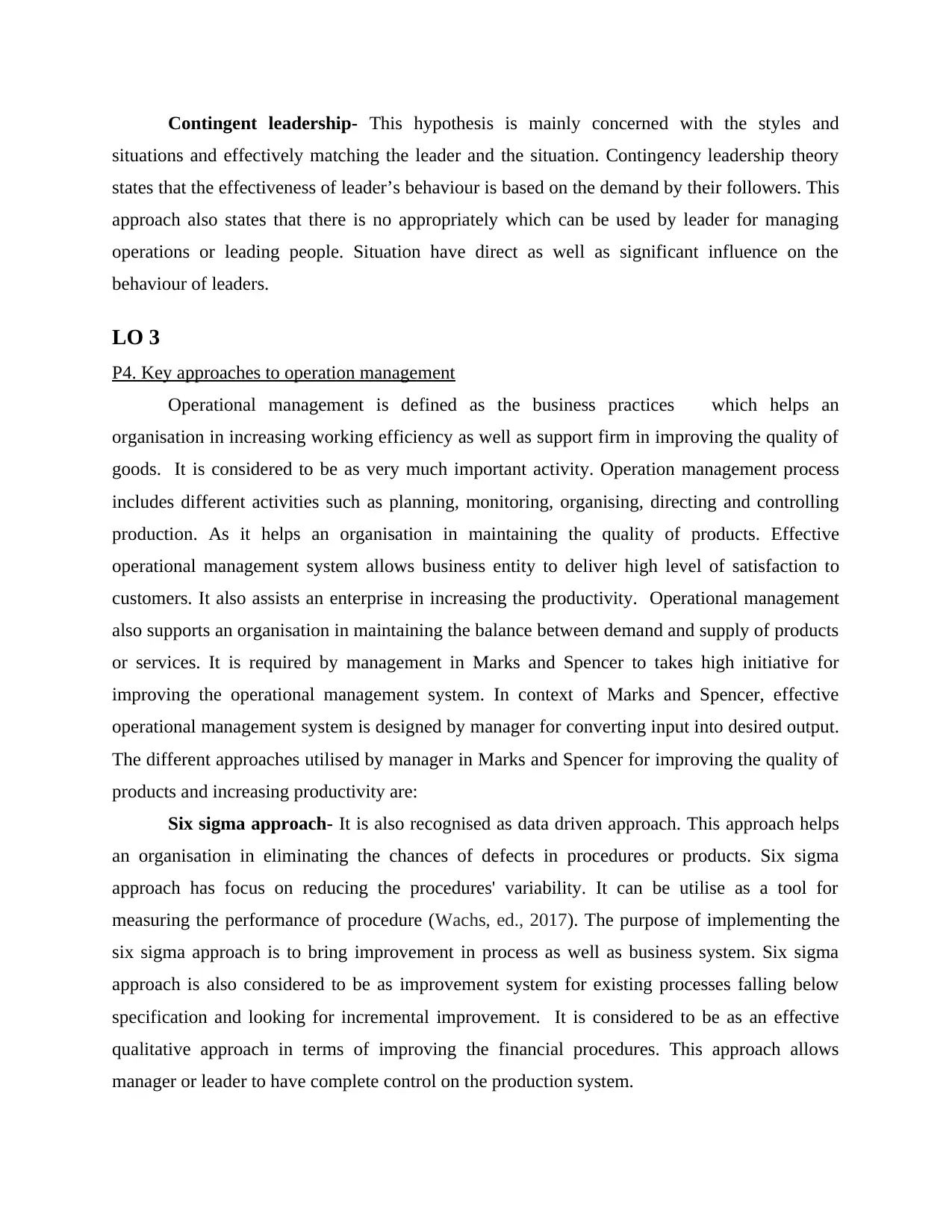
Contingent leadership- This hypothesis is mainly concerned with the styles and
situations and effectively matching the leader and the situation. Contingency leadership theory
states that the effectiveness of leader’s behaviour is based on the demand by their followers. This
approach also states that there is no appropriately which can be used by leader for managing
operations or leading people. Situation have direct as well as significant influence on the
behaviour of leaders.
LO 3
P4. Key approaches to operation management
Operational management is defined as the business practices which helps an
organisation in increasing working efficiency as well as support firm in improving the quality of
goods. It is considered to be as very much important activity. Operation management process
includes different activities such as planning, monitoring, organising, directing and controlling
production. As it helps an organisation in maintaining the quality of products. Effective
operational management system allows business entity to deliver high level of satisfaction to
customers. It also assists an enterprise in increasing the productivity. Operational management
also supports an organisation in maintaining the balance between demand and supply of products
or services. It is required by management in Marks and Spencer to takes high initiative for
improving the operational management system. In context of Marks and Spencer, effective
operational management system is designed by manager for converting input into desired output.
The different approaches utilised by manager in Marks and Spencer for improving the quality of
products and increasing productivity are:
Six sigma approach- It is also recognised as data driven approach. This approach helps
an organisation in eliminating the chances of defects in procedures or products. Six sigma
approach has focus on reducing the procedures' variability. It can be utilise as a tool for
measuring the performance of procedure (Wachs, ed., 2017). The purpose of implementing the
six sigma approach is to bring improvement in process as well as business system. Six sigma
approach is also considered to be as improvement system for existing processes falling below
specification and looking for incremental improvement. It is considered to be as an effective
qualitative approach in terms of improving the financial procedures. This approach allows
manager or leader to have complete control on the production system.
situations and effectively matching the leader and the situation. Contingency leadership theory
states that the effectiveness of leader’s behaviour is based on the demand by their followers. This
approach also states that there is no appropriately which can be used by leader for managing
operations or leading people. Situation have direct as well as significant influence on the
behaviour of leaders.
LO 3
P4. Key approaches to operation management
Operational management is defined as the business practices which helps an
organisation in increasing working efficiency as well as support firm in improving the quality of
goods. It is considered to be as very much important activity. Operation management process
includes different activities such as planning, monitoring, organising, directing and controlling
production. As it helps an organisation in maintaining the quality of products. Effective
operational management system allows business entity to deliver high level of satisfaction to
customers. It also assists an enterprise in increasing the productivity. Operational management
also supports an organisation in maintaining the balance between demand and supply of products
or services. It is required by management in Marks and Spencer to takes high initiative for
improving the operational management system. In context of Marks and Spencer, effective
operational management system is designed by manager for converting input into desired output.
The different approaches utilised by manager in Marks and Spencer for improving the quality of
products and increasing productivity are:
Six sigma approach- It is also recognised as data driven approach. This approach helps
an organisation in eliminating the chances of defects in procedures or products. Six sigma
approach has focus on reducing the procedures' variability. It can be utilise as a tool for
measuring the performance of procedure (Wachs, ed., 2017). The purpose of implementing the
six sigma approach is to bring improvement in process as well as business system. Six sigma
approach is also considered to be as improvement system for existing processes falling below
specification and looking for incremental improvement. It is considered to be as an effective
qualitative approach in terms of improving the financial procedures. This approach allows
manager or leader to have complete control on the production system.
Paraphrase This Document
Need a fresh take? Get an instant paraphrase of this document with our AI Paraphraser
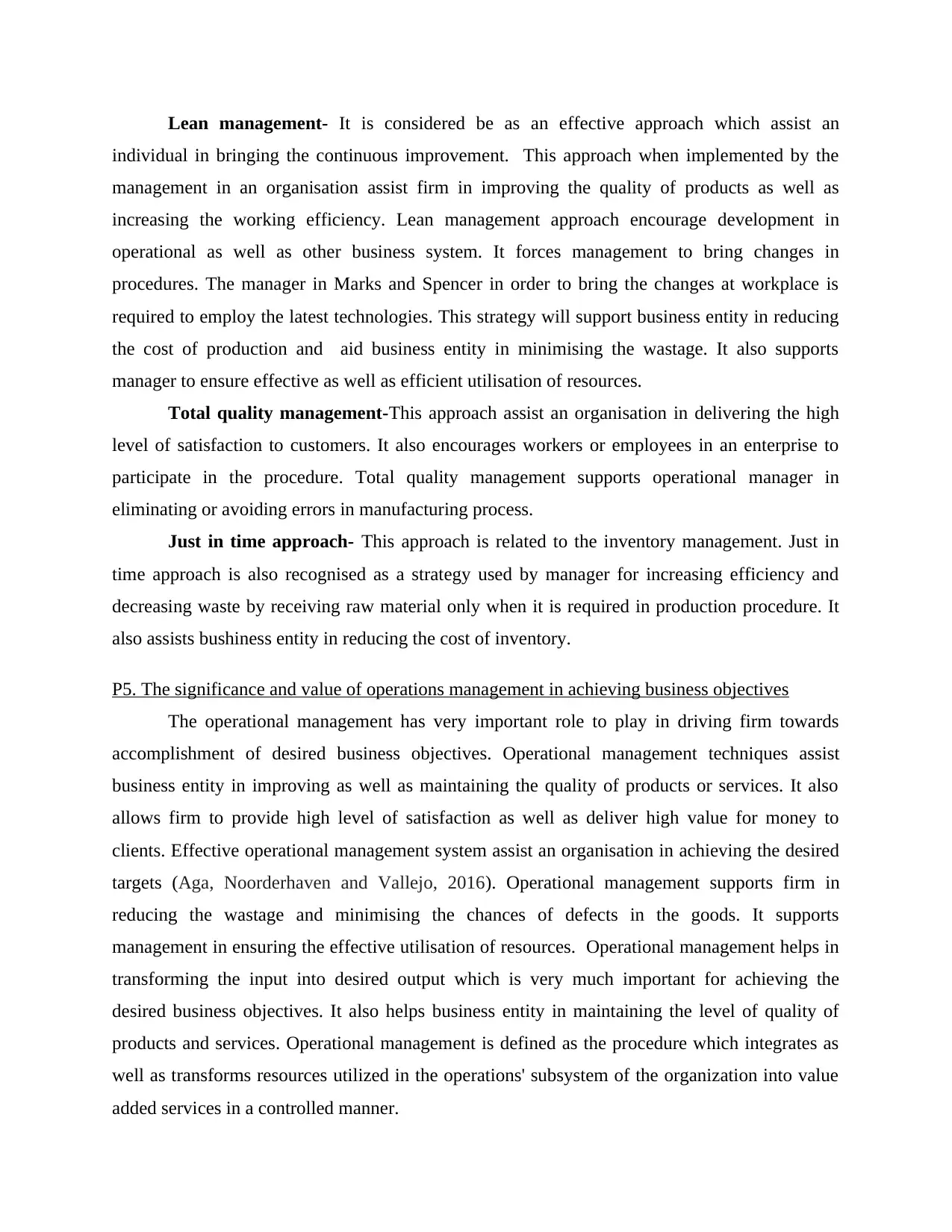
Lean management- It is considered be as an effective approach which assist an
individual in bringing the continuous improvement. This approach when implemented by the
management in an organisation assist firm in improving the quality of products as well as
increasing the working efficiency. Lean management approach encourage development in
operational as well as other business system. It forces management to bring changes in
procedures. The manager in Marks and Spencer in order to bring the changes at workplace is
required to employ the latest technologies. This strategy will support business entity in reducing
the cost of production and aid business entity in minimising the wastage. It also supports
manager to ensure effective as well as efficient utilisation of resources.
Total quality management-This approach assist an organisation in delivering the high
level of satisfaction to customers. It also encourages workers or employees in an enterprise to
participate in the procedure. Total quality management supports operational manager in
eliminating or avoiding errors in manufacturing process.
Just in time approach- This approach is related to the inventory management. Just in
time approach is also recognised as a strategy used by manager for increasing efficiency and
decreasing waste by receiving raw material only when it is required in production procedure. It
also assists bushiness entity in reducing the cost of inventory.
P5. The significance and value of operations management in achieving business objectives
The operational management has very important role to play in driving firm towards
accomplishment of desired business objectives. Operational management techniques assist
business entity in improving as well as maintaining the quality of products or services. It also
allows firm to provide high level of satisfaction as well as deliver high value for money to
clients. Effective operational management system assist an organisation in achieving the desired
targets (Aga, Noorderhaven and Vallejo, 2016). Operational management supports firm in
reducing the wastage and minimising the chances of defects in the goods. It supports
management in ensuring the effective utilisation of resources. Operational management helps in
transforming the input into desired output which is very much important for achieving the
desired business objectives. It also helps business entity in maintaining the level of quality of
products and services. Operational management is defined as the procedure which integrates as
well as transforms resources utilized in the operations' subsystem of the organization into value
added services in a controlled manner.
individual in bringing the continuous improvement. This approach when implemented by the
management in an organisation assist firm in improving the quality of products as well as
increasing the working efficiency. Lean management approach encourage development in
operational as well as other business system. It forces management to bring changes in
procedures. The manager in Marks and Spencer in order to bring the changes at workplace is
required to employ the latest technologies. This strategy will support business entity in reducing
the cost of production and aid business entity in minimising the wastage. It also supports
manager to ensure effective as well as efficient utilisation of resources.
Total quality management-This approach assist an organisation in delivering the high
level of satisfaction to customers. It also encourages workers or employees in an enterprise to
participate in the procedure. Total quality management supports operational manager in
eliminating or avoiding errors in manufacturing process.
Just in time approach- This approach is related to the inventory management. Just in
time approach is also recognised as a strategy used by manager for increasing efficiency and
decreasing waste by receiving raw material only when it is required in production procedure. It
also assists bushiness entity in reducing the cost of inventory.
P5. The significance and value of operations management in achieving business objectives
The operational management has very important role to play in driving firm towards
accomplishment of desired business objectives. Operational management techniques assist
business entity in improving as well as maintaining the quality of products or services. It also
allows firm to provide high level of satisfaction as well as deliver high value for money to
clients. Effective operational management system assist an organisation in achieving the desired
targets (Aga, Noorderhaven and Vallejo, 2016). Operational management supports firm in
reducing the wastage and minimising the chances of defects in the goods. It supports
management in ensuring the effective utilisation of resources. Operational management helps in
transforming the input into desired output which is very much important for achieving the
desired business objectives. It also helps business entity in maintaining the level of quality of
products and services. Operational management is defined as the procedure which integrates as
well as transforms resources utilized in the operations' subsystem of the organization into value
added services in a controlled manner.
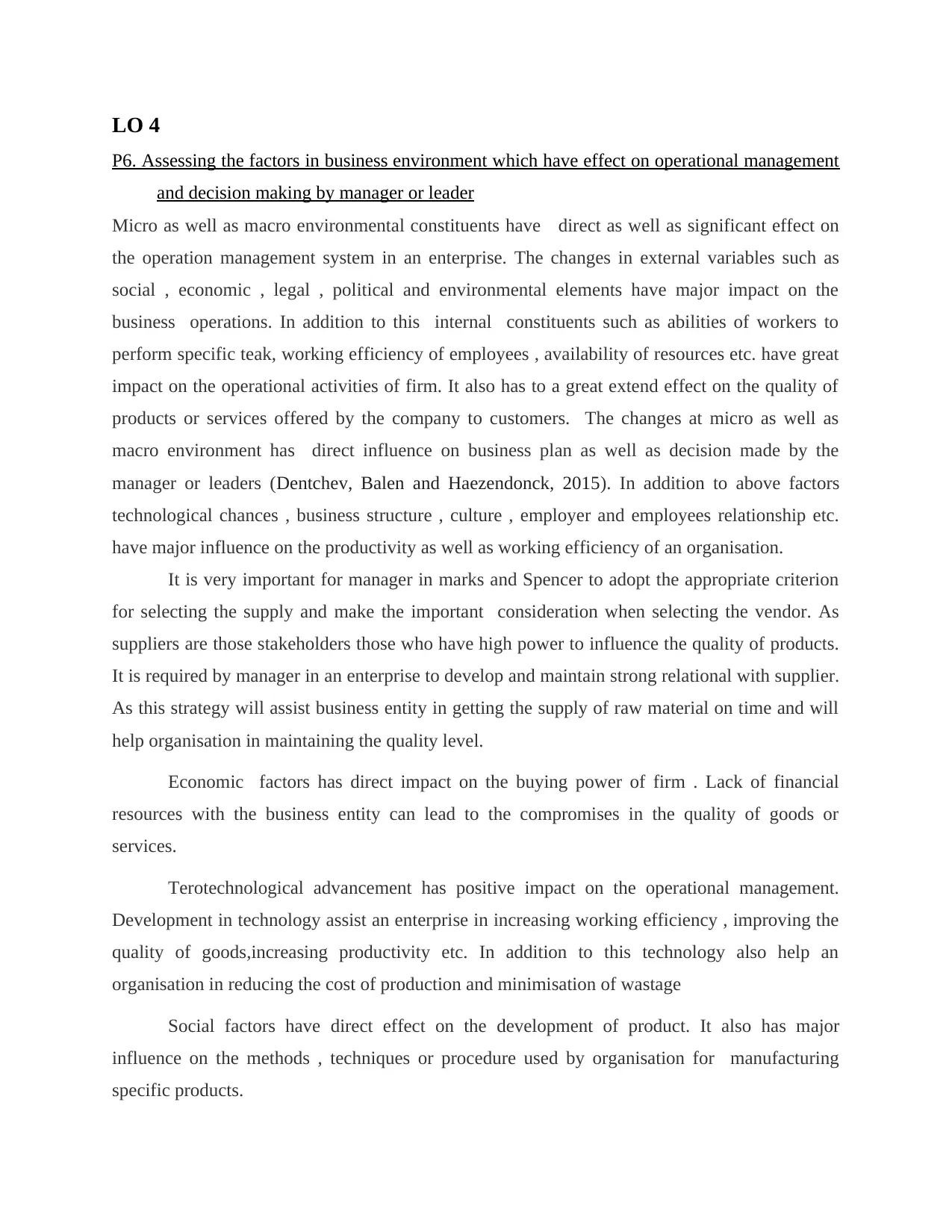
LO 4
P6. Assessing the factors in business environment which have effect on operational management
and decision making by manager or leader
Micro as well as macro environmental constituents have direct as well as significant effect on
the operation management system in an enterprise. The changes in external variables such as
social , economic , legal , political and environmental elements have major impact on the
business operations. In addition to this internal constituents such as abilities of workers to
perform specific teak, working efficiency of employees , availability of resources etc. have great
impact on the operational activities of firm. It also has to a great extend effect on the quality of
products or services offered by the company to customers. The changes at micro as well as
macro environment has direct influence on business plan as well as decision made by the
manager or leaders (Dentchev, Balen and Haezendonck, 2015). In addition to above factors
technological chances , business structure , culture , employer and employees relationship etc.
have major influence on the productivity as well as working efficiency of an organisation.
It is very important for manager in marks and Spencer to adopt the appropriate criterion
for selecting the supply and make the important consideration when selecting the vendor. As
suppliers are those stakeholders those who have high power to influence the quality of products.
It is required by manager in an enterprise to develop and maintain strong relational with supplier.
As this strategy will assist business entity in getting the supply of raw material on time and will
help organisation in maintaining the quality level.
Economic factors has direct impact on the buying power of firm . Lack of financial
resources with the business entity can lead to the compromises in the quality of goods or
services.
Terotechnological advancement has positive impact on the operational management.
Development in technology assist an enterprise in increasing working efficiency , improving the
quality of goods,increasing productivity etc. In addition to this technology also help an
organisation in reducing the cost of production and minimisation of wastage
Social factors have direct effect on the development of product. It also has major
influence on the methods , techniques or procedure used by organisation for manufacturing
specific products.
P6. Assessing the factors in business environment which have effect on operational management
and decision making by manager or leader
Micro as well as macro environmental constituents have direct as well as significant effect on
the operation management system in an enterprise. The changes in external variables such as
social , economic , legal , political and environmental elements have major impact on the
business operations. In addition to this internal constituents such as abilities of workers to
perform specific teak, working efficiency of employees , availability of resources etc. have great
impact on the operational activities of firm. It also has to a great extend effect on the quality of
products or services offered by the company to customers. The changes at micro as well as
macro environment has direct influence on business plan as well as decision made by the
manager or leaders (Dentchev, Balen and Haezendonck, 2015). In addition to above factors
technological chances , business structure , culture , employer and employees relationship etc.
have major influence on the productivity as well as working efficiency of an organisation.
It is very important for manager in marks and Spencer to adopt the appropriate criterion
for selecting the supply and make the important consideration when selecting the vendor. As
suppliers are those stakeholders those who have high power to influence the quality of products.
It is required by manager in an enterprise to develop and maintain strong relational with supplier.
As this strategy will assist business entity in getting the supply of raw material on time and will
help organisation in maintaining the quality level.
Economic factors has direct impact on the buying power of firm . Lack of financial
resources with the business entity can lead to the compromises in the quality of goods or
services.
Terotechnological advancement has positive impact on the operational management.
Development in technology assist an enterprise in increasing working efficiency , improving the
quality of goods,increasing productivity etc. In addition to this technology also help an
organisation in reducing the cost of production and minimisation of wastage
Social factors have direct effect on the development of product. It also has major
influence on the methods , techniques or procedure used by organisation for manufacturing
specific products.
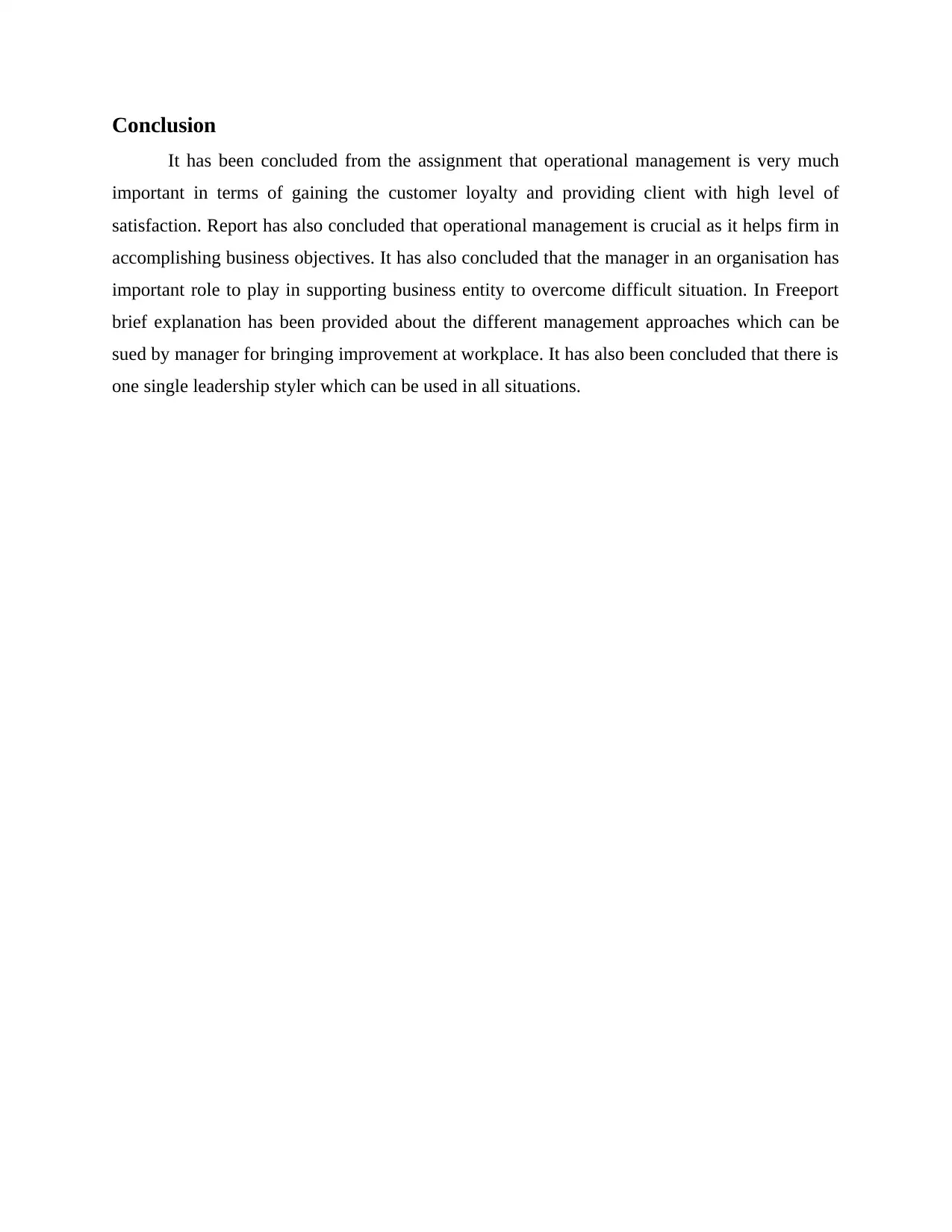
Conclusion
It has been concluded from the assignment that operational management is very much
important in terms of gaining the customer loyalty and providing client with high level of
satisfaction. Report has also concluded that operational management is crucial as it helps firm in
accomplishing business objectives. It has also concluded that the manager in an organisation has
important role to play in supporting business entity to overcome difficult situation. In Freeport
brief explanation has been provided about the different management approaches which can be
sued by manager for bringing improvement at workplace. It has also been concluded that there is
one single leadership styler which can be used in all situations.
It has been concluded from the assignment that operational management is very much
important in terms of gaining the customer loyalty and providing client with high level of
satisfaction. Report has also concluded that operational management is crucial as it helps firm in
accomplishing business objectives. It has also concluded that the manager in an organisation has
important role to play in supporting business entity to overcome difficult situation. In Freeport
brief explanation has been provided about the different management approaches which can be
sued by manager for bringing improvement at workplace. It has also been concluded that there is
one single leadership styler which can be used in all situations.
Secure Best Marks with AI Grader
Need help grading? Try our AI Grader for instant feedback on your assignments.
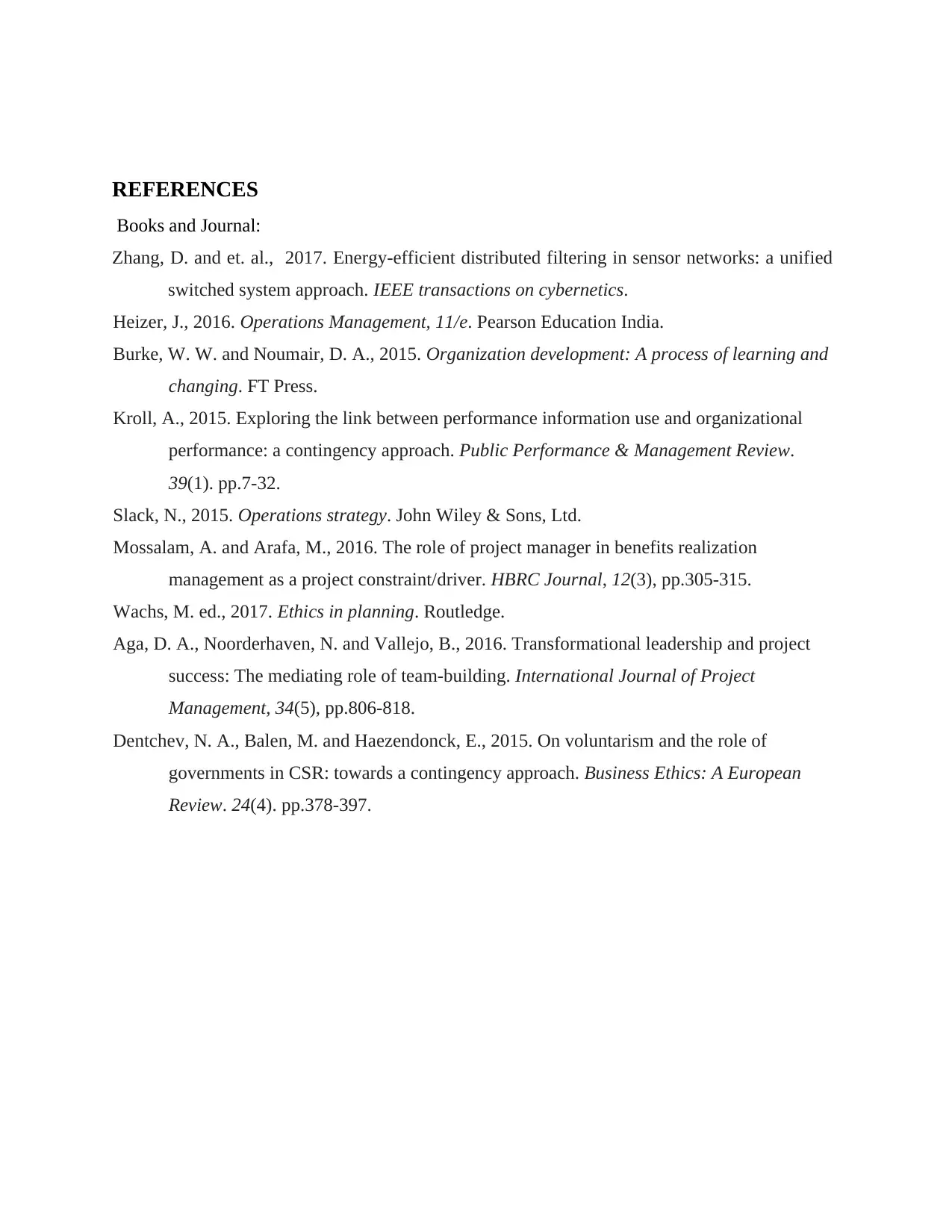
REFERENCES
Books and Journal:
Zhang, D. and et. al., 2017. Energy-efficient distributed filtering in sensor networks: a unified
switched system approach. IEEE transactions on cybernetics.
Heizer, J., 2016. Operations Management, 11/e. Pearson Education India.
Burke, W. W. and Noumair, D. A., 2015. Organization development: A process of learning and
changing. FT Press.
Kroll, A., 2015. Exploring the link between performance information use and organizational
performance: a contingency approach. Public Performance & Management Review.
39(1). pp.7-32.
Slack, N., 2015. Operations strategy. John Wiley & Sons, Ltd.
Mossalam, A. and Arafa, M., 2016. The role of project manager in benefits realization
management as a project constraint/driver. HBRC Journal, 12(3), pp.305-315.
Wachs, M. ed., 2017. Ethics in planning. Routledge.
Aga, D. A., Noorderhaven, N. and Vallejo, B., 2016. Transformational leadership and project
success: The mediating role of team-building. International Journal of Project
Management, 34(5), pp.806-818.
Dentchev, N. A., Balen, M. and Haezendonck, E., 2015. On voluntarism and the role of
governments in CSR: towards a contingency approach. Business Ethics: A European
Review. 24(4). pp.378-397.
Books and Journal:
Zhang, D. and et. al., 2017. Energy-efficient distributed filtering in sensor networks: a unified
switched system approach. IEEE transactions on cybernetics.
Heizer, J., 2016. Operations Management, 11/e. Pearson Education India.
Burke, W. W. and Noumair, D. A., 2015. Organization development: A process of learning and
changing. FT Press.
Kroll, A., 2015. Exploring the link between performance information use and organizational
performance: a contingency approach. Public Performance & Management Review.
39(1). pp.7-32.
Slack, N., 2015. Operations strategy. John Wiley & Sons, Ltd.
Mossalam, A. and Arafa, M., 2016. The role of project manager in benefits realization
management as a project constraint/driver. HBRC Journal, 12(3), pp.305-315.
Wachs, M. ed., 2017. Ethics in planning. Routledge.
Aga, D. A., Noorderhaven, N. and Vallejo, B., 2016. Transformational leadership and project
success: The mediating role of team-building. International Journal of Project
Management, 34(5), pp.806-818.
Dentchev, N. A., Balen, M. and Haezendonck, E., 2015. On voluntarism and the role of
governments in CSR: towards a contingency approach. Business Ethics: A European
Review. 24(4). pp.378-397.
1 out of 11
Related Documents
Your All-in-One AI-Powered Toolkit for Academic Success.
+13062052269
info@desklib.com
Available 24*7 on WhatsApp / Email
![[object Object]](/_next/static/media/star-bottom.7253800d.svg)
Unlock your academic potential
© 2024 | Zucol Services PVT LTD | All rights reserved.





